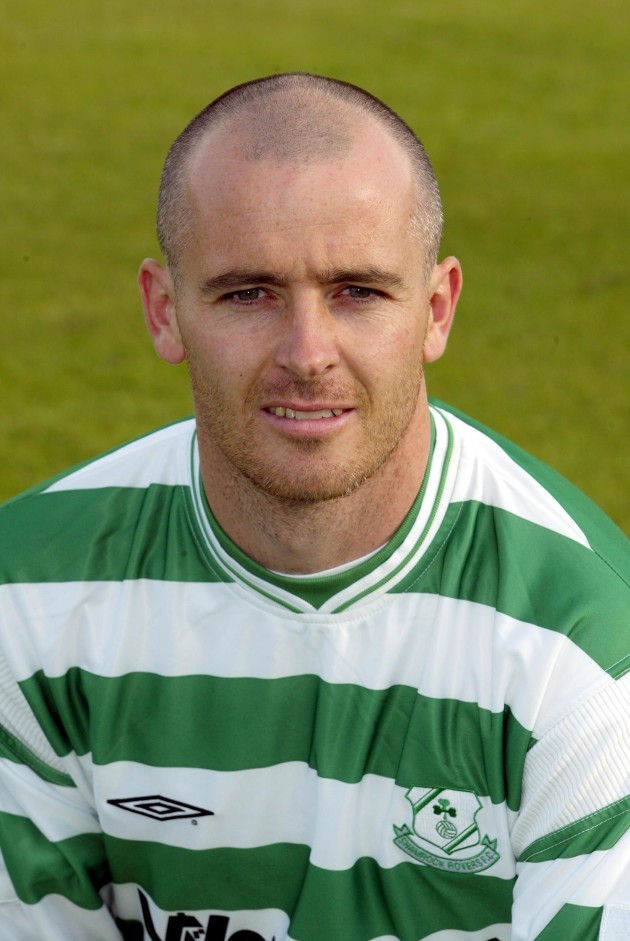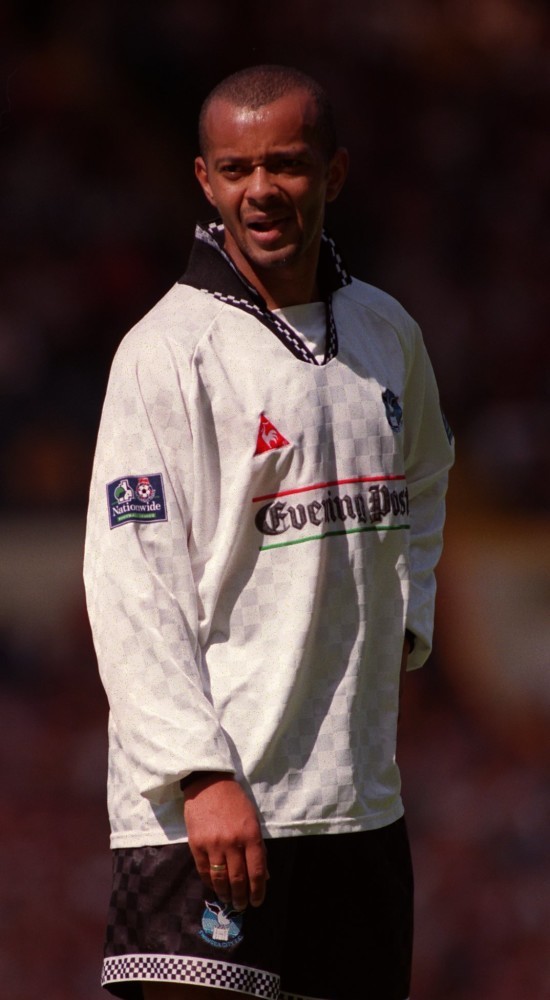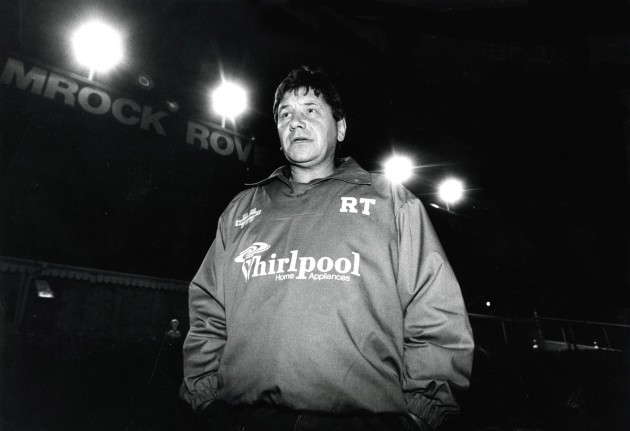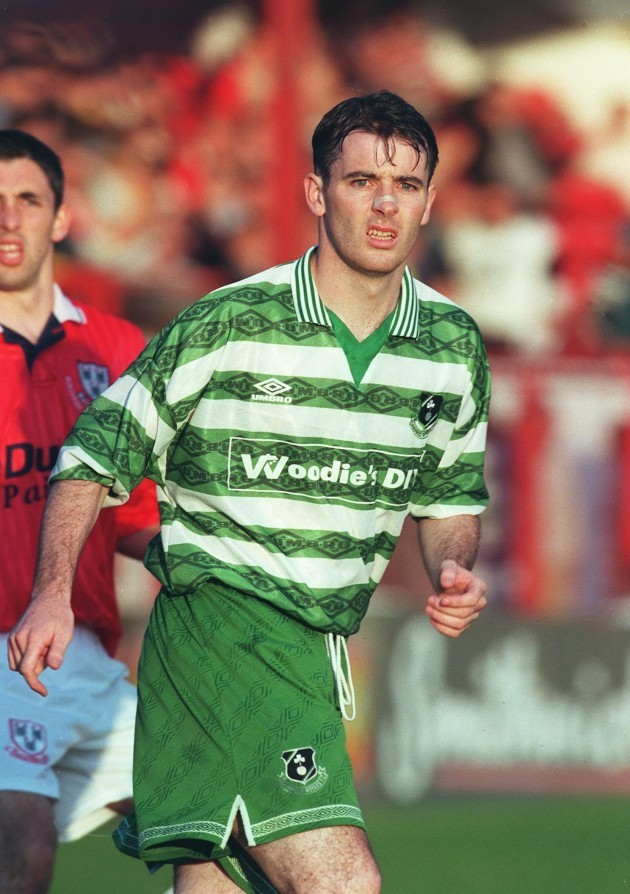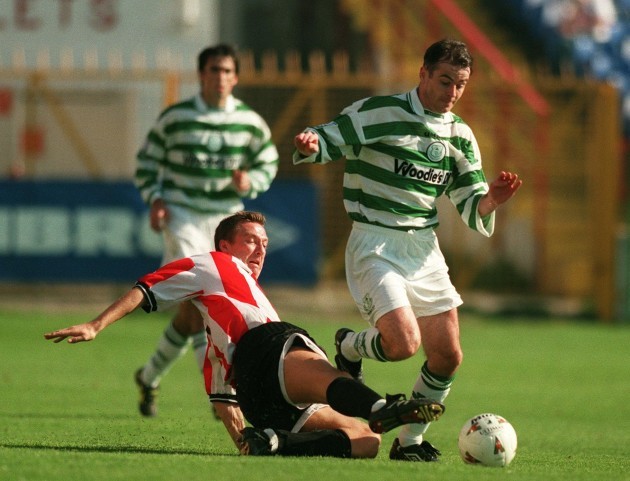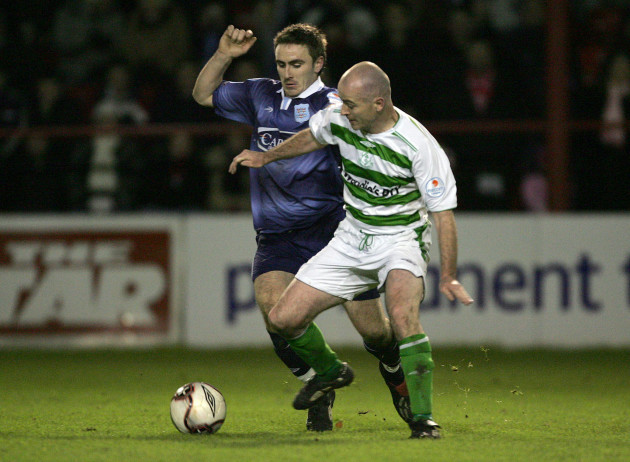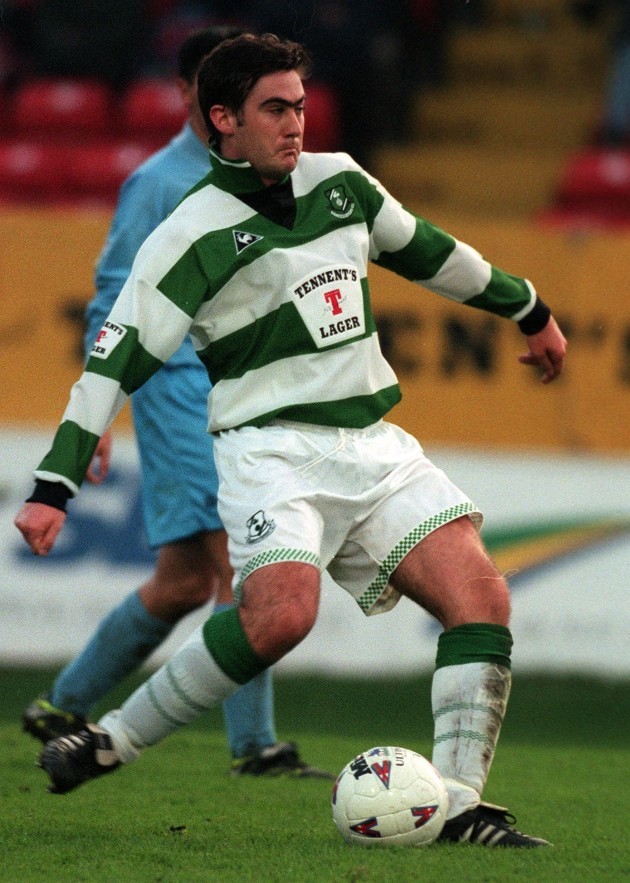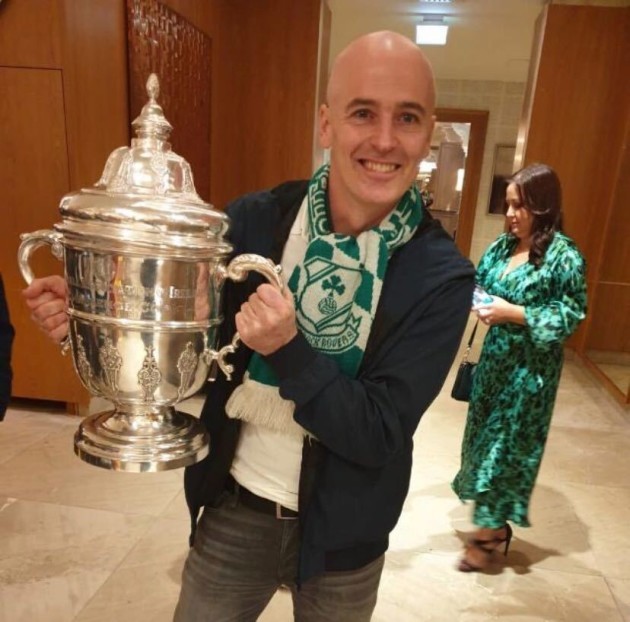IN 17 SEASONS at Shamrock Rovers, Derek Tracey made just shy of 500 appearances under 11 different managers.
During his time in the green and white hoops, they experienced league success, cup final agony, examinership, relegation and an even a takeover by fans, which began the long road back to their current status as FAI Cup holders and genuine Premier Division contenders.
Stephen Bradley’s side held a three-point lead over Dundalk at the top of the table when global sport was shut down — five games into the 2020 campaign — in March.
As the protracted move from Glenmalure Park to Tallaght Stadium had not yet materialised, a nomadic period in Rovers’ history saw them play home matches at six different grounds (including one at Turner’s Cross).
One-club men are a rare and dying breed — even more so in the League of Ireland — so for Tracey to enjoy that kind of longevity is an astounding achievement, particularly when you consider that lining out for the reserves was the extent of his ambition upon arriving way back in 1989.
Part of a sports-mad family living in Howth, Derek tried his hand at everything as a child. Summers were spent playing with his brothers and family friends, the Nangles, in a nearby field at Deerpark Golf Club, then they would relocate out onto the road during winter months.
The youngest side at Howth Celtic was U12 so he made a late start in competitive football and stuck with the local club right up to U18s. Struggling for numbers in a notoriously difficult age group to field teams, however, Tracey opted to step away for a couple of months until he got a call to link up with Belvedere.
They were the reigning All-Ireland champions, so he jumped at the chance to test himself alongside the cream of the crop. Kwame Ampadu was leaving Belvo after securing a move to Arsenal and they needed a replacement. Ampadu, who is the father of current Wales and Chelsea player Nathan, would go on to sign for the likes of Swansea City, West Brom and Exeter City, while representing the Republic of Ireland at U21 level.
He is currently Thierry Henry’s assistant at MLS outfit Montreal Impact, having coached at Arsenal and Monaco.
“I was meant to be a direct replacement for Kwame, so they were massive boots to fill,” Tracey tells The42. “He was probably the most outstanding player of that age group and there were great things expected of him.
“I was going to arguably the best schoolboy team in the country and it took me half a season to break in. I remember one game I came on after about ten minutes and scored a hat-trick. That gave me a bit of confidence and from there I saw out the season in midfield.
“The two managers, Eddie Foy and Ken McCarthy, were brilliant. I probably learned more in that year than in any other year — even in the League of Ireland.”
Belvo claimed the title and the Leinster Junior Cup, beating their own U17s in the final but only after losing out to them in the All-Ireland. At the end of the season, Tracey, along with team-mates Paul Usher, Wesley Robb and John Gallagher, was offered a place on the summer course run by Shamrock Rovers.
“Honest to God, I never thought I’d get anything out of it,” he admits. “Getting a game for the second team would have been the height of my ambition at the time.
“There were 20 lads on that course and if you were to judge them by their reputations, I would have been one of the last as I never played underage for Ireland or went on trials, but the full-time football suited me.”
Being coached by Liam Buckley — who was then still a player at Rovers — John Devine and Charlie Walker was a real boost to Tracey’s development, while he was training alongside new signings like Vinny Arkins and Gino Brazil on a daily basis.
It was actually an injury to Buckley in the warm-up before a Leinster Senior Cup game against St James’ Gate that would hand him his first-team debut in August 1989.
Having done the famous four-in-a-row under Jim McLaughlin and, subsequently, player-manager Dermot Keely, the club was shrouded in major uncertainty as a result of the Kilcoyne brothers’ decision to sell their home ground in Milltown for housing.
Keely’s second and final season in charge was played at a near-empty Tolka Park as Hoops supporters demonstrated their anger by boycotting games. By the time Tracey was making his bow under Noel King, they had become tenants of their great rivals Bohemians at Dalymount Park.
Rovers were no longer the dominant side in the league, but still saw themselves as the biggest club in the country and their fans have remained demanding over the years — through the good times and the bad.
“There was huge expectation from fans as you were playing for Shamrock Rovers,” Tracey says.
“Growing up in Howth, the League of Ireland wasn’t a big thing so going down there and seeing the passion the supporters had for the club was a massive eye-opener for me.
“At times, it was hard. They’d let you know what they thought of you and it was sink or swim. I saw a lots of good players who came to Rovers and couldn’t handle the pressure. You’d get a bit of stick, I got some myself but I managed to come through that.
You need to have a thick skin, but you know where they’re coming from. There were times when you might have deserved it and that’s just the nature of the game. They care so much about the club.”
Tracey was in and out of the team during his first season, but relished working with King, whose coaching methods were “tough but enjoyable”.
By the following year, he was getting regular game time and the campaign culminated in a run to the 1991 FAI Cup final, where Galway United would provide opposition at Lansdowne Road.
While Rovers felt they had more than enough to claim the prestigious competition for the 25th time, the Tribesman — aiming for their first FAI Cup triumph — had other ideas.
“To be honest with you, we thought we just had to turn up for that one,” Tracey admits. “We had beaten Galway three times that year, and convincingly.
“So we rocked up and lost 1-0. We were rubbish on the day and thoroughly deserved it. I remember the overconfidence. There were badges made saying the 25th FAI Cup for Rovers and all of this stuff.
“We had a good side with Vinny Arkins and Derek Swan up front, who were top notch. Dave Connell on the right, Peter Eccles at the back. We just didn’t perform on the day.”
With four minutes to go, the game looked to be heading for extra-time when Tracey was beaten to a header in midfield from Rovers’ goal-kick. Tommy Keane raced down the wing and squared for Galway skipper Johnny Glynn, who snatched victory with his clinical finish from close range.
“I was devastated with the result, but I had just turned 20 and was thinking that Rovers were always winning cups so we’d be back soon,” he adds. “Little did I know it would take another 11 years before we reached the final again.”
They finished sixth in the table that season and when ex-Rovers and Ireland striker Ray Treacy took over from King in January 1992, he set about transforming them into title challengers.
Stephen Geoghegan, Paul Osam and Alan Byrne were signed, while John Toal returned from Drogheda United for a second spell. By now, they had relocated to the RDS and although the club was about to enjoy some success, Tracey endured a turbulent time under his namesake.
“I didn’t play a lot in 93/94, and that period was the closest I ever got to leaving Rovers,” he reveals.
There were two occasions when Tracey felt he was “gone”. The first was halfway through that season when Limerick were interested in a loan move and he was put on the transfer list. Told he wasn’t to play with the reserves on the Saturday, he instead trained with the first team and was shocked when the Hoops manager instructed him to bring his gear the following day as he would be on the bench against Dundalk.
So I went from leaving the club on the Thursday to coming on with half an hour to go on the Sunday,” he explains. “That summed up my relationship with Ray, I just never knew where I stood with him. I was convinced I was leaving and here I was back involved in the squad all of a sudden.”
Rovers would finish with a seven-point lead over defending champions Cork City to claim their first title since 1987, while 23 goals saw Geoghegan named the league’s top scorer.
However, what should have been a pinnacle moment in Tracey’s career instead left him feeling a little empty.
“It was tough but at the end of the day I had a lot of friends playing in the team,” he says. “I wasn’t really involved but I obviously had an attachment to Rovers. I think I made about ten appearances and I got a medal out of it but ask anyone, you want to make a decent contribution. So that medal doesn’t really mean much to me, as my input was minimal.”
He also offers a word of advice for any aspiring footballer who may not be flavour of the month with their manager, adding:
“I ended up playing for 11 managers at Rovers, nine permanent and two caretakers. I bumped heads with one or two of them, but I generally got on with them all.
“When I joined, I was a really quiet lad. I was shy and would stick to myself, but one thing I learned, and I think managers appreciate it, is if I was left out or dropped I’d go and have a word with them. Don’t have a row, but go have a word. It shows that you care. I was never afraid of knocking on the door and asking why I wasn’t playing.”
Then came the second moment he thought his days at Rovers were numbered. Again put on the transfer list, Tracey was informed he could leave but first travelled north with the squad for a number of pre-season friendlies.
Playing well in the final game of four and with key players Geoghegan, Eccles and Alan Byrne moving on to new pastures, he was asked by Treacy to stick around for six weeks but ended up being handed a two-year deal.
From that point, he nailed down his place in the team and began to believe he was good enough to mix it with the best in the division. Getting picked to represent the League of Ireland and finishing the following season as the club’s top scorer only strengthened that belief.
“It’s mad. I went from not being able to get into my club team to being picked for the LOI select side, the best XI, in three months. It just shows you how much confidence plays a part.
“That was the period I was able to convince myself that I could cut the mustard, playing with the top players in the league. From there on, I became an ever-present with Rovers. That was the start of it.”
Managers would come and go over the seasons that followed — Alan O’Neill, Terry Eviston, Mick Byrne and Pat Byrne — but it wasn’t until 2001/02 under the guidance of Damien Richardson that they challenged for the Premier Division again.
“On a couple of occasions through those years we had half-decent teams but we just weren’t strong enough,” Tracey says. “Shels, Pat’s and Cork all had better squads and we just didn’t have the strength in depth. We had good sides but lacked a bit of quality in certain areas.”
He had come close to departing a couple of times because of the manager’s wishes, but the shoe was now on the other foot as clubs expressed their interest in the midfielder, whose versatility meant he lined out in a number of positions throughout his playing days.
Shelbourne, St Patrick’s Athletic and a couple of Irish League clubs were believed to be keen at one point or another, which he admits using as leverage when it was time to sign new deals. However, the bond Tracey had established over more than a decade of service meant there was only one place he envisaged being.
I just didn’t want to leave Rovers. They had been good to me and it was drummed into me at that stage what it meant to play for them. Once I had gotten over those uncertain years with Ray, it was never an ambition of mine to go.
“If you offered me a bucket full of medals, I would never swap it for my time at Rovers. Maybe it has something to do with where I came from. There’s a bit of a parish mentality out there and all my mates ended up playing with Howth Celtic.
“I wanted to stay and I was content with what I had. Maybe other managers or players that I played against could say I lacked ambition, but that couldn’t have been further from the truth. Did I want to go and win leagues? Of course I did. I was ambitious but I wanted to achieve things with Rovers.”
In October 2002, Rovers reached the FAI Cup final again but lost out 1-0 Derry City thanks to a decisive volley from the great Liam Coyle. In the second final of that year — due to the League of Ireland’s switch to summer football — the game at Tolka Park was delayed temporarily after a the base of a floodlight pylon caught fire.
James Keddy had missed a glorious opportunity to equalise when Hoops boss Liam Buckley threw on Tracey — now sporting a shaved head — and Shane Robinson, but the pair of substitutes were unable to make the most of one last half-chance late in injury time.
Perhaps the club’s lowest point during his 17 years came in 2005. Having entered examinership, Rovers were deducted eight points for financial irregularities and, managed by Roddy Collins, took on his former club Dublin City in the promotion/relegation play-off.
But with Collins suspended by Rovers pending an internal investigation (he was later sacked), Alan O’Neill took charge for the two-legged tie, which they lost 3-2 on aggregate despite having the likes of Tony Sheridan, Trevor Molloy, Mark Rutherford and Brian Shelley in their ranks.
“They won the first game 2-1 but we didn’t have a keeper for the second leg as Barry Murphy got injured,” says Tracey.
“I remember Alan scouring everywhere for one. That’s how bad it was at that stage. We eventually brought in [the retired] John Walsh, who was ex-Bray Wanderers and he actually played well for us in that game.”
Trailing 1-0 on the night in the return tie, Tracey pulled one back and could then have drawn them level on aggregate in the dying moments, but headed agonisingly wide from Molloy’s cross and their fate was sealed.
“That header haunted me for a few years, to be honest,” he remembers. “At the time, I was devastated to be relegated but it actually resulted in the 400 Club coming in to take over, so in hindsight it was probably the best thing that could have happened.”
Former club captain Pat Scully was then handed the job of ensuring Rovers made an immediate return to the top flight. He began a complete clear-out of the squad and although Tracey was one of the few kept on, his former team-mate didn’t have the veteran in his plans.
“I met Pat and he more or less told me that he couldn’t see my playing. I was 35 at this time and he didn’t think I’d be fit enough.
“The funny thing was that I did the training and I was flying. I felt I had never been as fit. At the end of the day, it was his prerogative but I don’t think I got a fair crack of the whip.”
Derek missed a week’s training in order to visit his sick brother in Spain, and was told to train with the second team when he returned. The time had come, he’d had enough.
“I remember playing a game for the second team and my head was gone. I just knew that day that I was finished,” he recalls. “I was building a house and we had our first child so for the first time since I was at Rovers, priorities changed.
I came in after that game and said I was going to pack it in. I rang the chairman Jonathan Roche, and he was great. They looked after me until the end of the season, which they didn’t have to do that as it was my choice to leave. I never really thanked him for that, so this is the opportunity to do it now.
“They also gave me a testimonial game a couple of years later, when they eventually got to Tallaght. It was brilliant. I managed to get a game on the pitch, and had my two daughters and my nephew there. We stayed in the Maldron Hotel across the road and had was a great night.”
As his career coincided with ‘the homeless years’ and he retired three years before the opening of Tallaght Stadium, that testimonial match in 2010 was Tracey’s first and only opportunity to run out at Rovers’ current ground.
“That [the new stadium] was like the pot of gold at the end of the rainbow for years. We first started to hear about it around 1996. When it was a shell of a ground, we even trained on it for a couple of weeks until we were kicked off for health and safety reasons. It was still a building site but the pitch was immaculate.
“It was like the Holy Grail, but unfortunately I never got a chance to play there competitively.”
Hundreds of players passed through Rovers while Tracey was on the books, and some inevitably left a bigger impression on him than others.
Paddy McCourt was there for about six months and even though we were going through the doldrums, he lit the place up,” he says. “His ability was unreal, he was just a maverick.
“The other one would be Marc Kenny, who is my best mate in football. You wouldn’t attempt the things those lads would do. Well, I wouldn’t! Mark’s range of passing and free-kicks were top drawer. Him and Paddy, skill-wise, were the two most talented.
“He would have been getting on a bit by the time he came to Rovers, but Tony Sheridan was probably one of the best players I played against.
“I loved the older lads too — Terry Eviston and Peter Eccles. They would be the opposite type of players in that they gave everything and would run through brick walls for you.”
After Rovers, he didn’t quite hang up the boots and returned to Howth Celtic for a couple of years before linking up with Marc and Harry Kenny at Leinster Senior League club Phoenix.
Now that playing is well and truly behind him, Tracey has been able to reflect on his achievements in the game.
“For me to stay at Rovers for 17 years was beyond my wildest dreams as a young lad. I loved everything about the club and I still do.”
Although work has obviously been halted by the pandemic, his electrical company (which he owns with the son of former Rovers defender Martin Lawlor, Bryan) and family life take priority nowadays. That said, Derek remains a Rovers fans and occasionally attends games with ex-team-mate Jason Colwell.
“I go up and pay my money at the gate,” he says. “I’m a supporter now and am no different to anyone else.
“I was up at the Dundalk game recently and it was amazing. The atmosphere was unreal, I loved every bit of it. At times, we were playing in front of 500 people at Morton Stadium so it’s brilliant to see the progress that the club has made since then.
“The cup final last season was brilliant and we’ve had a couple of great nights out.”
The42 is on Instagram! Tap the button below on your phone to follow us!
